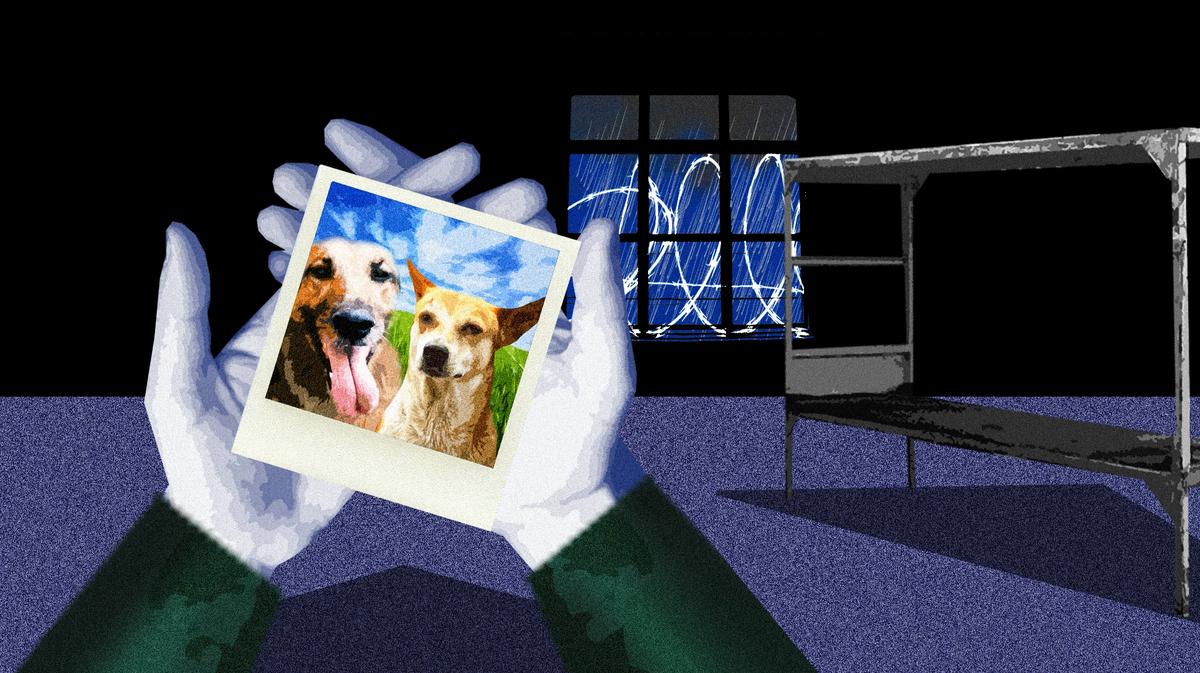“Dear Eric! Since the first days spent in my temporary place of residence, I have wanted to write you a farewell letter, yet I couldn’t find the strength, as it was painful and tearful. But it is important to me.” Thus begins a letter of Belarusian human rights activist Anastasia Loika, who is currently in pre-trial jail on charges of inciting hatred and organising acts that grossly violate public order. She faces up to eight years in prison. The Eric that she is saying goodbye to from prison is not a man, however. Eric is her dog. A big, handsome, elderly shepherd-like dog.
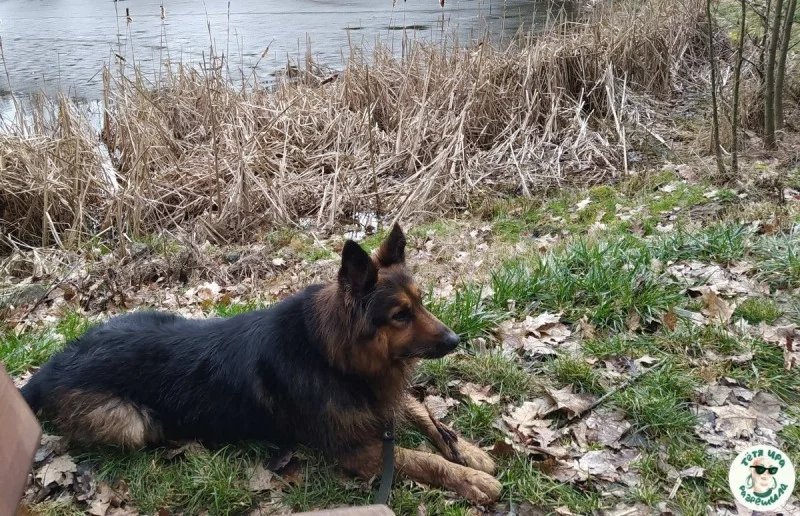
Eric, to whom Anastasia Loika wrote her farewell letter. Photo: Telegram
‘Sorry it’s not me anymore’
Anastasia took Eric from a shelter where her friend Marfa Rabkova was working as a volunteer. Marfa, also a human rights activist, is now serving a 15-year prison sentence. Anastasia is sure to meet Marfa in the penal colony in Homiel. It is unlikely that she will meet Eric. In February, she wrote him a farewell letter from prison. Here is an excerpt from this letter:
“For a dog to be happy is to make their human happy. I’m sorry it’s not me anymore.
I hope that the rest of your life will be peaceful and joyful. I’ve already given up on my life. As a farewell (and as an excuse) I want to tell you something about the day I last saw you, 28 October 2022.
At first, the riot police said they would have to kill you, but then they offered to give me 20 seconds to get you into the bathroom. I was crying and scared, there were men with machine guns walking up the stairs with me.
At the door, they uncuffed my hands from behind my back and handcuffed them in front of me. My hands were shaking as I opened the door. Deep breaths helped only a little. I expected you to immediately feel danger in the presence of evil people, but you came out into the hallway to me and wagged your tail happily.
Handcuffed, I couldn’t even grab your collar — I just opened the shower door and asked you to go in. You didn’t understand anything — I never put you in that room, too small for you. In desperation, I shouted at you and kicked you inside. The police blocked the door with a kitchen chair as you growled and jumped at the door in the narrow space.
During the “search”, which was done without my permission, they threw books and papers onto your cot and bowls while I sat motionless on the sofa in utter apathy. Before I left, I asked several times for them to release you. I don’t remember exactly what I said to you, but I told you I was going away for a long time. I cried on the stairs. Beyond that, it’s best that you stay unaware of what has happened and will happen to me.
Goodbye, dear dog. You are the dearest thing I have ever had in my life. I will love you always.”
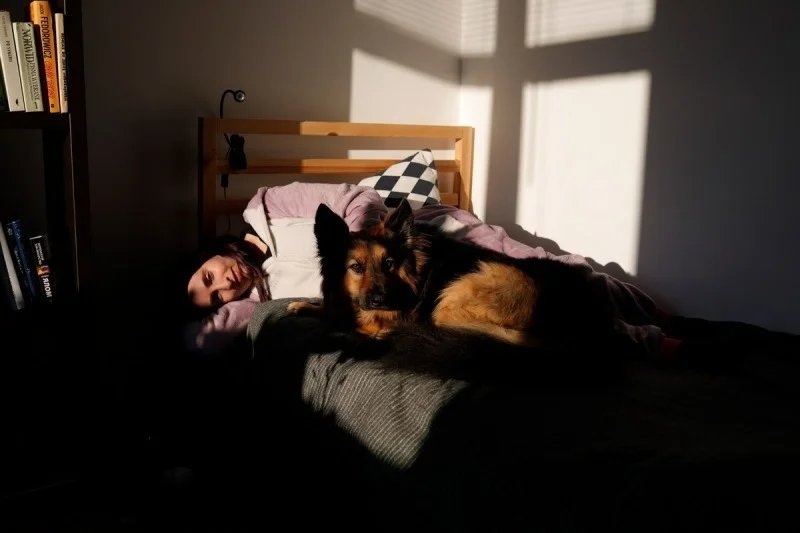
Anastasia Loika and Eric. Photo: Telegram
Eric now lives in the Czech Republic, on the border with Germany. Now, Eric has a house with a lake and long walks in the forest. What he does not have anymore is Anastasia.
Bely, the shaman’s dog
Those who followed the march of Siberian shaman Alexander Gabyshev to Moscow — to drive Putin out of the Kremlin — have probably noticed a white dog beside him. That is Bely [the Russian word for “white” — translator’s note]. He is waiting for his owner in Yakutsk, in the kind home of Victoria Postnikova and blogger Sergei Tikhoy. No one knows how long he has to wait.
The shaman has no sentence to keep track of. He, like the Soviet dissidents of the seventies, became a victim of involuntary psychiatric treatment and has already spent over two years in a mental hospital, first in Novosibirsk and now in Ussuriysk. Nobody knows when he will be released. Neither does Bely.
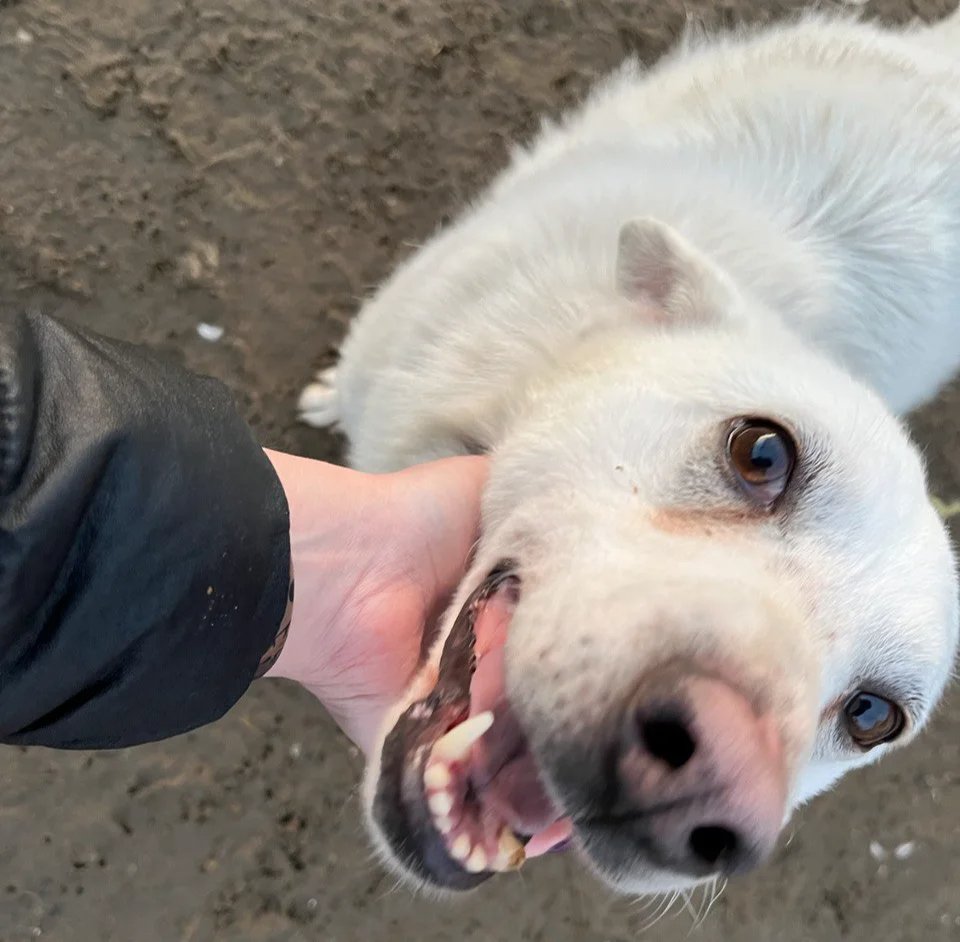
Bely, Shaman Gabyshev’s dog. Photo: Victoria Postnikova
“When the shaman and his group were arrested”, Victoria says, “I went to his house as soon as I heard about it and saw three dogs. Bely and two of his sisters. I used to visit the shaman and the dogs knew me. The three dogs were sitting there frightened. Bely ran up to me, started pleading. I let them out of the house, then the shaman’s sister came out and said it would be difficult for her to manage three dogs. So I decided to take him with me, but I didn’t know if he would want to come. I called a taxi, and when it arrived, I asked: ‘Bely, will you come with me? It’ll be nice for you at my place’. And you know, he understood. He jumped into the car by himself.
His eyes seem human. I now consider him my guardian angel. When we had run-ins with the police and FSB, Bely reacted very aggressively.
He would lunge at them, and at one point they just went away. He behaves fine towards ordinary people, but he hates people in uniform. He probably has traumatic memories. He is always nearby, he never runs away. He guards us and we can rely on him. I always say: he is not an ordinary dog, but a dog of the Shaman. Everyone in the group loved Bely. And I don’t even know if I’ll have the heart to give him back when Alexander is released.”
Basya and her puppies
Basya the Malamute from Minsk has grown accustomed to the disappearances of her owner Maxim Vinyarsky ever since birth. On her first birthday in 2018, Basya was apprehended with her owner during a walk. Basya was picked up from the police station by family friends and Maxim was jailed for 15 days. Basya is a true dog of the opposition: she was born during a police search and made a big puddle in the police station where she and Maxim were taken on her birthday.
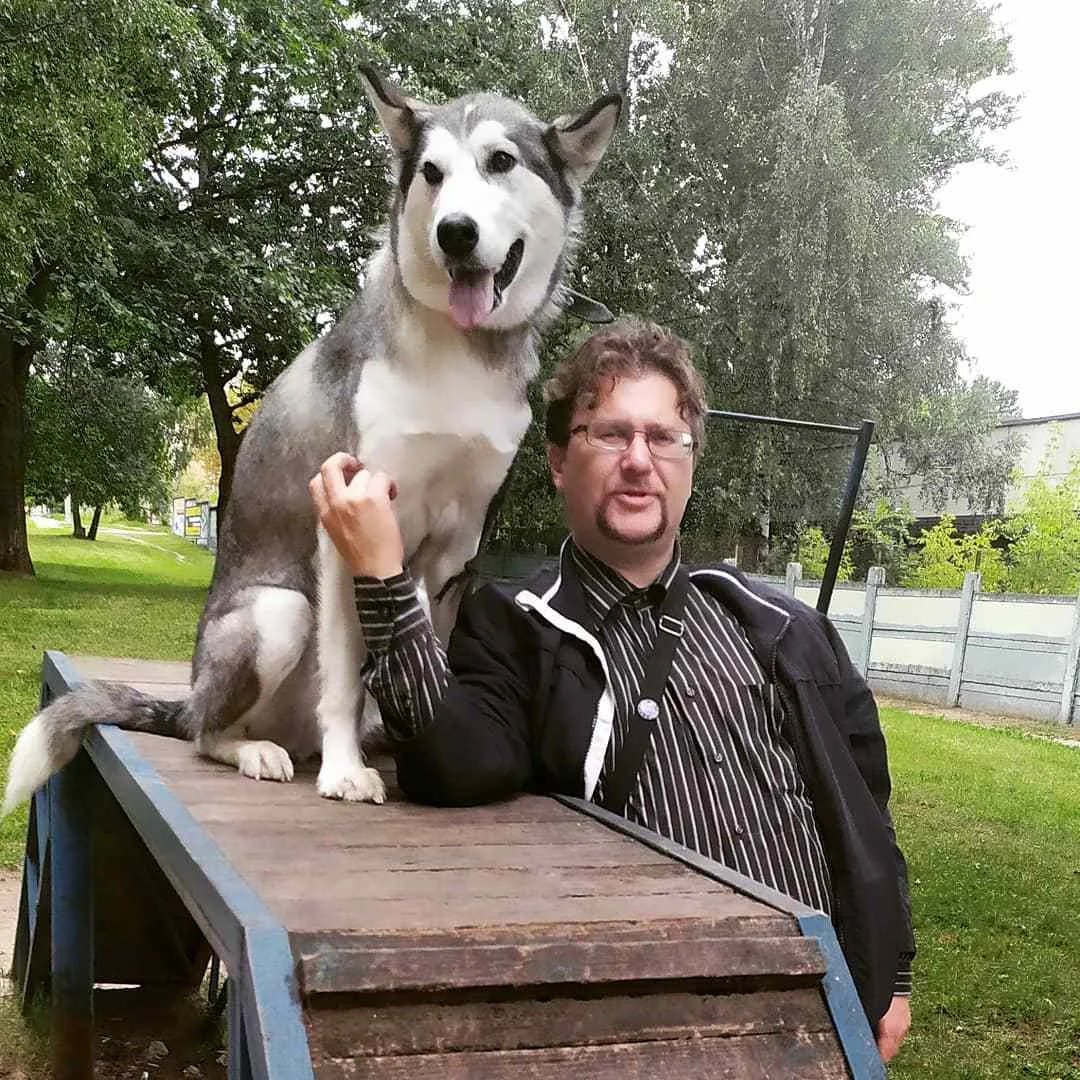
Maxim Vinyarsky with Basya. Photo: family archive
Before 2020, her owner often disappeared for 15 days: Maxim Vinyarsky of the civil campaign “European Belarus” has always irritated law enforcement and been detained at every protest. It is difficult to calculate how much time in total Maxim has spent in the pre-trial detention centre in Minsk, but it is surely years.
Shortly after the mass protests began in 2020, Maxim took Basya to his mother: he realised that it would be days before he was arrested again — and for much longer than 15 days. And so it happened: Vinyarsky was arrested on 22 January 2021 and sentenced to five years behind bars for “organising mass riots”.
Basya suffered not only without her owner, but also without long, fun walks. She used to go running with Maxim and even swim when he took her to the lake. His mother could not provide that, so Maxim’s sister Lena took Basya instead. Lena has a husband, four children, and a dog named Jesya. Jesya is a small dog — just right for a big family in a city flat. The flat is not designed to house a Malamute, however, but Basya wanted to run around, so the family had to make a bit of room.
“And then Basya fell in love with the handsome Husky next door.” Lena says. “We really hoped that nothing would happen. We told ourselves that Basya’s tummy hadn’t grown but had just become hairier. And then one day, when I was at work, I got a call from home saying: we have a puppy here! By the time I came home in the evening, there were already eight puppies.”
Basya turned out to be a very responsible mother. She didn’t give preference to any of the pups and nurtured all of them equally. Sometimes, a dog will push away the weaker puppies to give the stronger ones a better chance. But Basya had enough time for all of them.
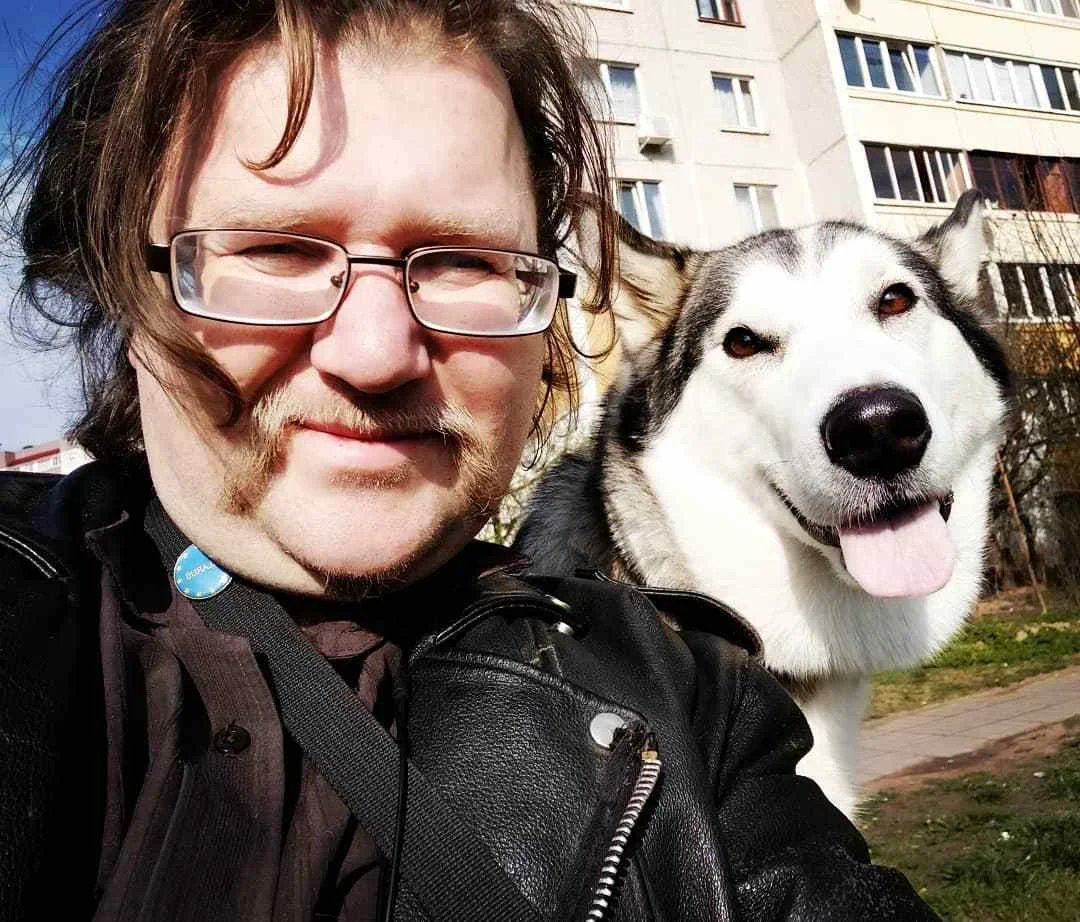
Maxim Vinyarsky with Basya. Photo: family archive
Lena found new homes for seven of the puppies. Juno, the eighth puppy, decided she was already adopted. So she stayed with the family. Puppies are seldom lucky to grow up next to their mothers — they are usually given away at a very young age. Juno was lucky. So now there are nine of them in the flat: Lena and her husband, four children, Jesya, Basya and Juno.
But Basya is waiting for Maxim. One day, Lena decided to bring Basya her toy from Maxim’s flat, and Basya clung onto it the whole evening. It was a toy from her happy life with Maxim. In his letters, Maxim asks his sister to take videos of Basya: “I’ll come back and watch them.” Maksim will be in prison for three more years. When he gets out, Basya will be nine. They will still have time to live together.
Birth during a police search
Basya’s mother, however, might not live to see her owner. Her name is Shtiya and she is 13. And her owner, Belarusian politician Yauhen Afnahel, who was arrested in September 2020 for organising protests, has been sentenced to seven years in prison.
He still has four years to serve. When he is released, Shtiya will be 17. I don’t know if Malamutes live to that age.
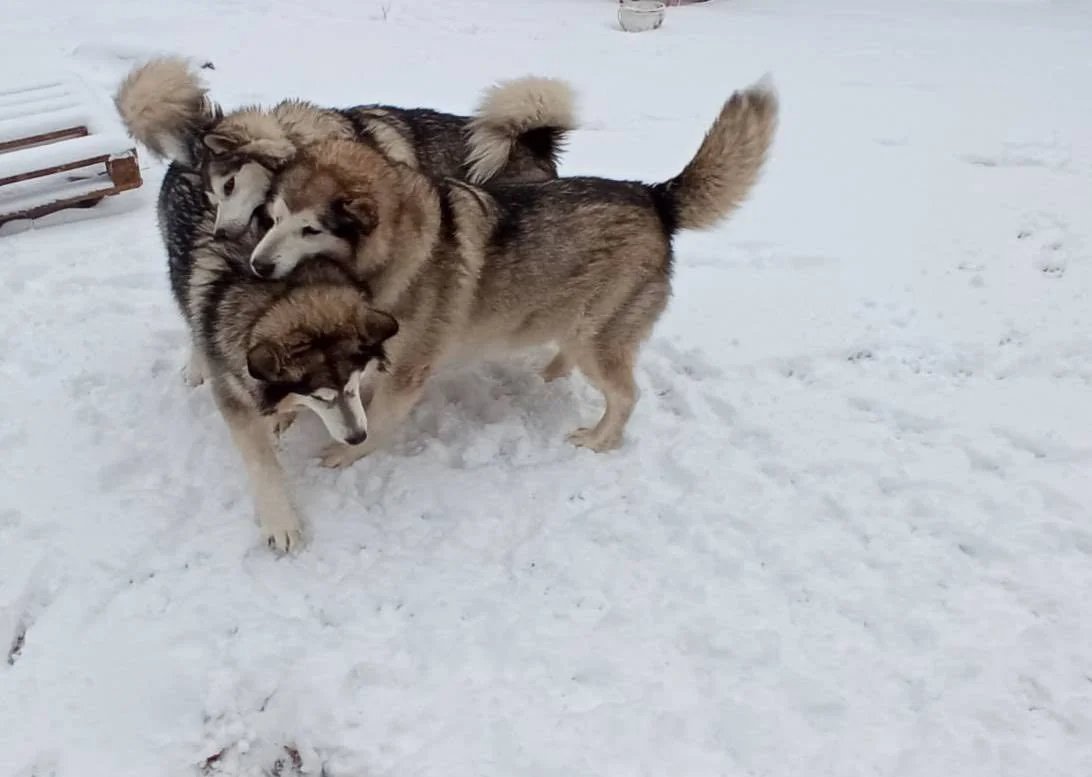
Shtiya, Nori, and Freya, Yauhen Afnahel’s Malamutes. Photo: family archive
For years, Yauhen dreamt of owning a Malamute. The breed is freedom-loving, willful, and stubborn — and that was exactly the kind of dog he wanted. In 2010, a few months before the presidential election and the ensuing mass protests, he bought a puppy and named it Shtiya, which means “strong” in the Aleut language.
After the December 2010 protests, the Belarusian KGB came for Yauhen, but he managed to hide from them in the false ceiling. The officers were ransacking the flat while he was hovering above them. They did not notice him and went away. Yauhen then escaped together with his dog.
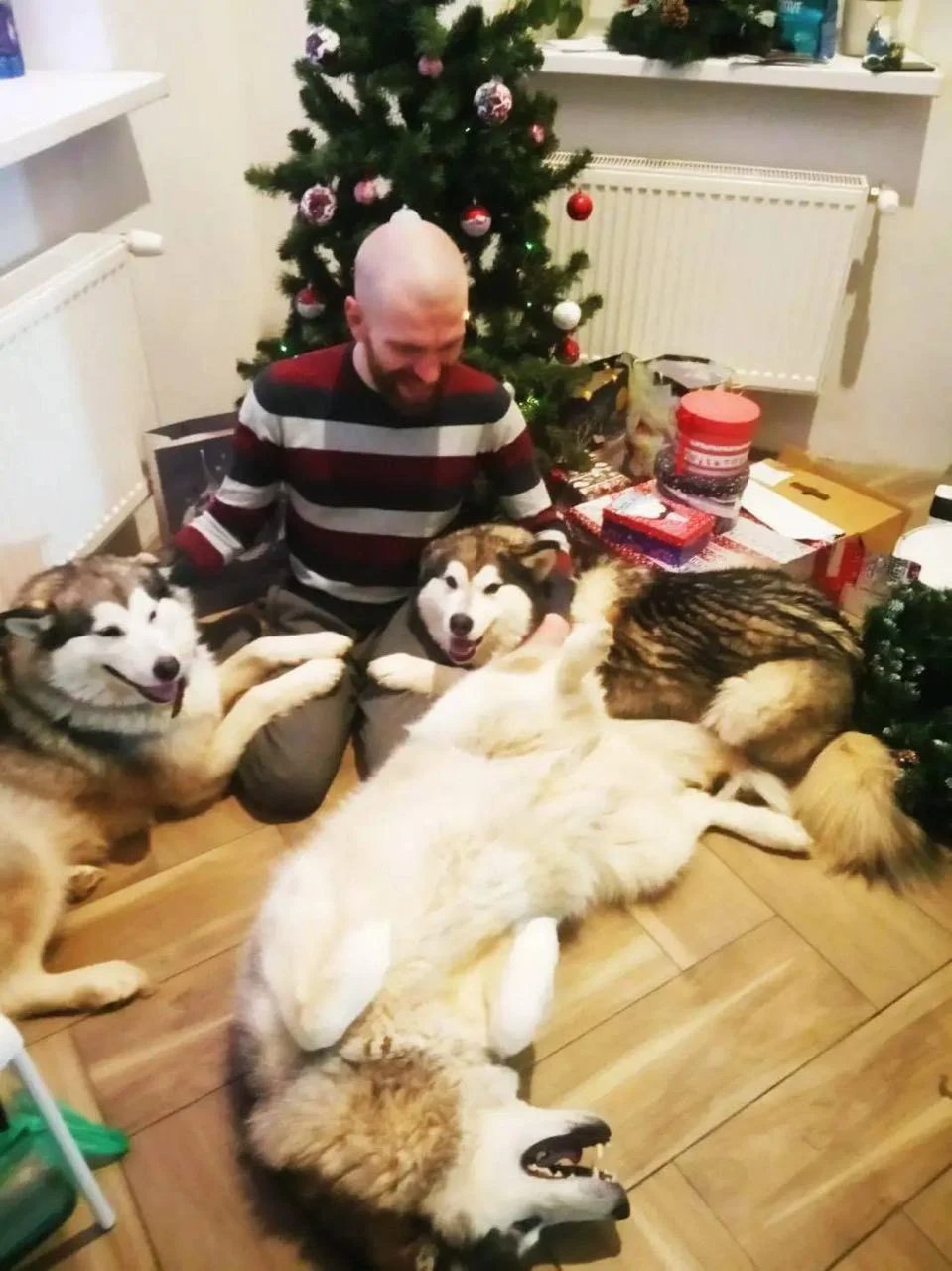
Yauhen with his Malamutes. Photo: family archive
Shtiya lived in Lithuania and Poland for a while until both of them returned to Belarus. Back at home, Yauhen and his wife Katya decided they wanted to have puppies. Two pups from the litter — Nori and Freya — stayed with them.
Yauhen dreamed of dog-sledding, but the winters in Belarus had become warm, with slush instead of snow. Instead, the dogs simply brought joy to their owners and ran around in the woods during long walks.
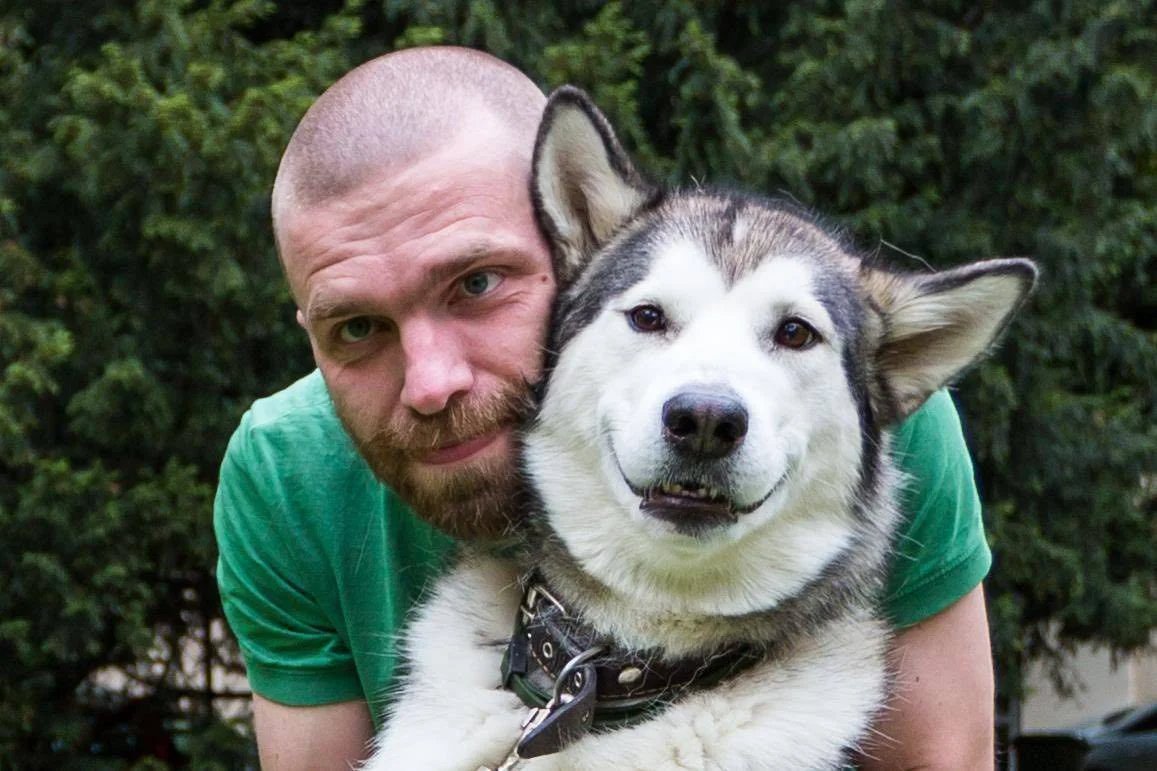
Yauhen and Shtiya shortly before his arrest. Photo: family archive
“On 23 March 2017, the doorbell rang: at the doorstep stood Zhenya [Yauhen — translator’s note] in handcuffs together with five policemen. ‘The flat will be searched now’, they said. At that moment, Shtiya went into labour. It was quite mental: they were searching the place and Shtiya was giving birth. But everything ended well that time,” Yauhen’s wife Katya recalls.
“When Zhenya was arrested in 2020, the dogs were sad, of course. Malamutes often howl — it’s their way of communicating. And our dogs often howled at the moon.
Shtiya had an especially strong bond with him, and she suffered a lot. The dogs are now in pet boarding, living near Minsk in a private house in good conditions. But I don’t know if Shtiya will live to see Zhenya, and that’s heartbreaking. I often send Zhenya pictures of our dogs, and he asks me to remember to wish them a happy birthday. I remember.”
Cats and dogs
Russian activist Mikhail Krieger, currently on trial in Moscow on charges of “justification of terrorism” and facing up to seven years in prison, has what is possibly the largest pet family among Russian political prisoners. Five dogs and two cats are now waiting for him to return home. Only one is a purebred — the tiny Toy Terrier Barik initially owned by Mikhail’s daughter Ekaterina. Ekaterina left Russia, and since it was a hassle to bring him along, Barik stayed in Moscow. All the others were strays and rescues. Barik, Malchik [Russian for “boy” — translator’s note], Betty, Susan, and Blackie are the dogs waiting for Mikhail to come back home.
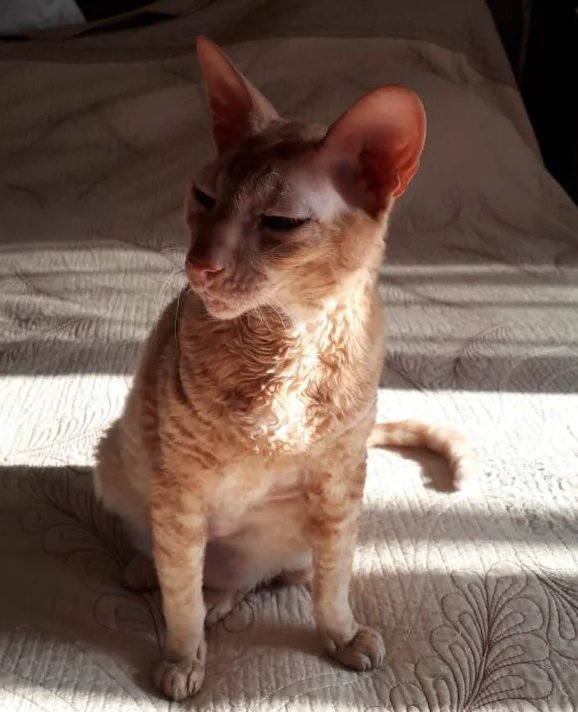
Rysya, Krieger’s cat. Photo: family archive
Then there are the cats, Chris and Rysya. Susan and Blackie are both 15 years old. Susan is still quite lively, but Blackie is not doing well. He is blind and frail.
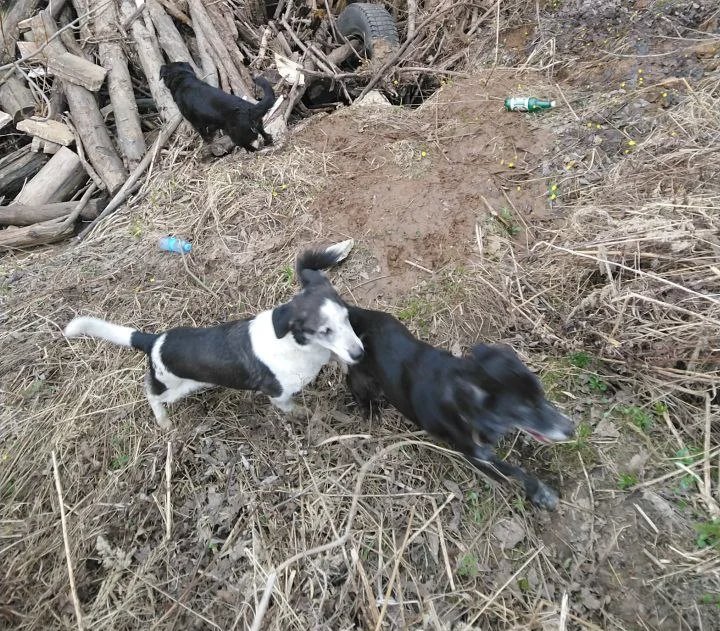
Krieger’s pets: Susan and Blackie, found in the street, both 15 years old. Malchik. Betty. Barik. Chris. Photo: family archive
“It’s not too bad now,” Mikhail’s wife Aisha, who now takes care of the animals, says. “they’re not that many. We sometimes had up to twenty [rescues] — especially in winter, during the cold. We used to be able to find new homes for the pretty, purebred, or just big dogs. It’s difficult now. Misha loves all his dogs. And they love him back. The dogs are always around, even at night, so he can reach out and pet them. Sounds unbelievable, but the dogs would even lick his heels. And Chris the cat liked to sleep on his pillow.”
In memory of Chupacabra
Susan and blind Blackie are unlikely to live to see their owner. Chupa, the dog of Alexey Gorinov, a Russian municipal deputy and activist sentenced to seven years in prison for anti-war comments, is among those pets for whom it is already too late. Alexey’s Facebook page has the following line in the “Family” section: “Dogs Jack and Chupa (Chupacabra)”. Both were rescued off the street. Neither is alive anymore.
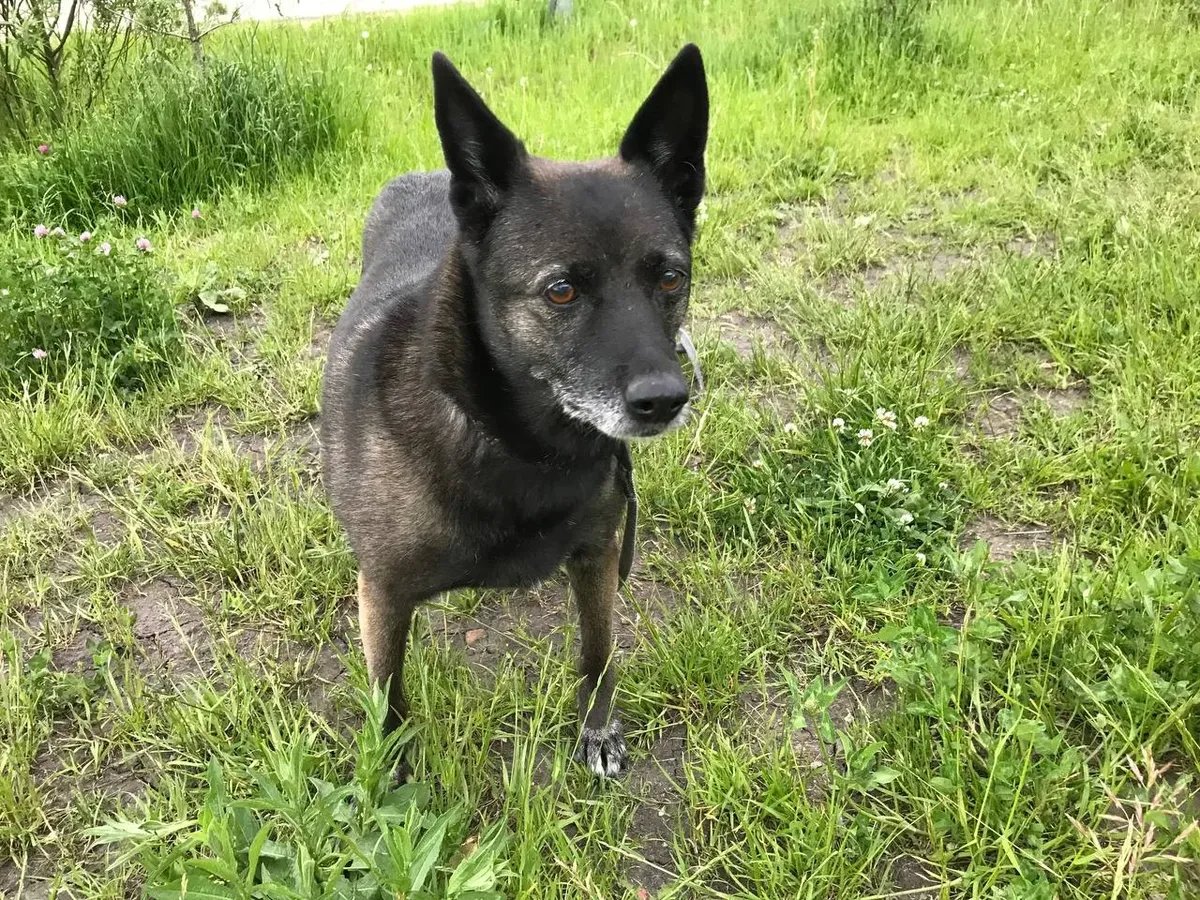
Chupa, Alexey Gorinov’s dog. Photo: Telegram
Jack died a year before Alexey’s arrest. He never found out what would happen to his owner a year later. He must have been lucky. Chupa found out. When Alexey Gorinov ended up in prison, Chupa rushed to the door every time the doorbell sounded, hoping he was back. After a while, she gave up. She died in late April.
Alexey probably realised that she could not live without him. Last year, shortly after he was sentenced, human rights activists paid him a visit They later cited what Alexey had told them:
“The saddest thing is that I won’t see my dog. She won’t live to see my release. She’s old and very attached to me.
I picked her up in the street, a stray. She’s got a delicate psyche. Too bad you can’t have dogs on conjugal visits. I wish I could see her one last time…” He never did.
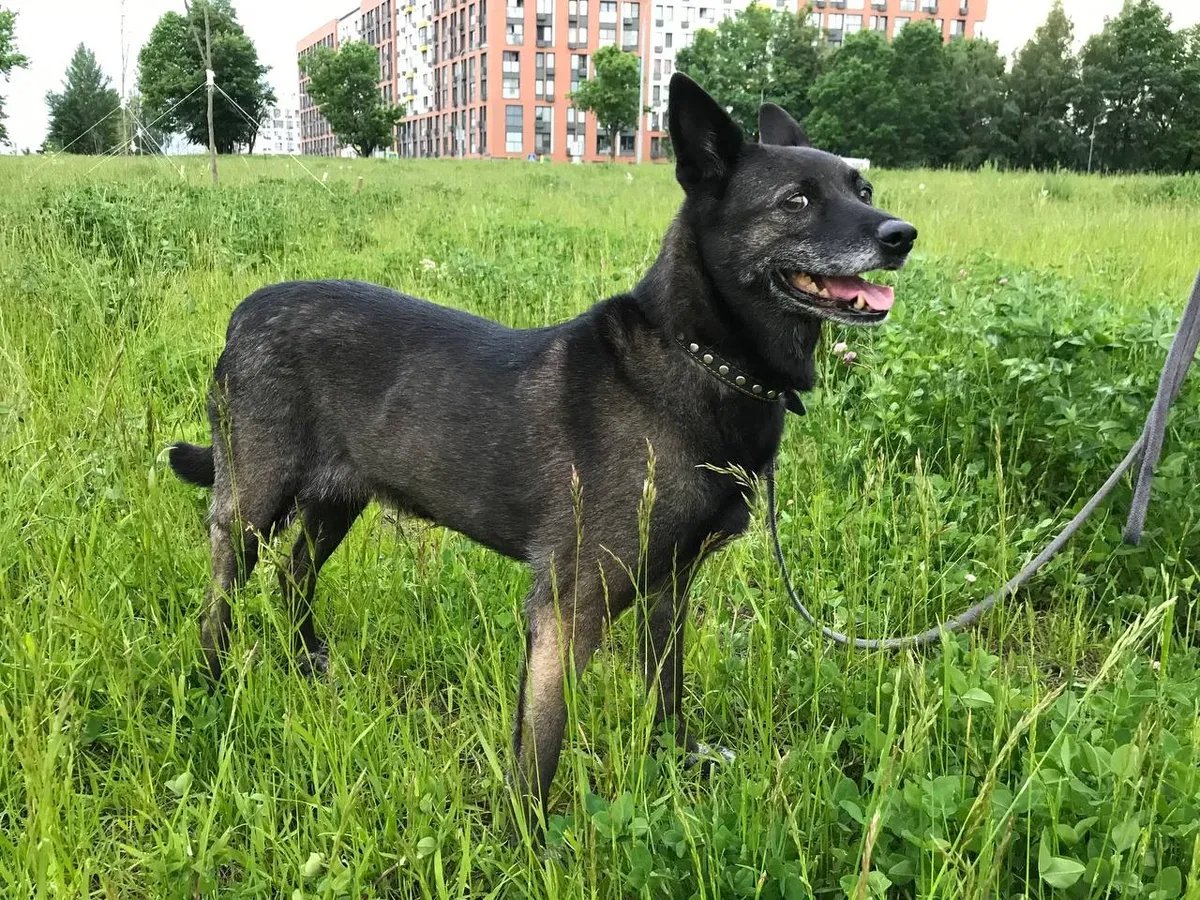
Chupa. Photo: Telegram
After Chupa’s death, Alexey’s friends published an excerpt of his letter describing his beloved dog: “She’s never chewed on anything and is generally very well-mannered. Doesn’t mix much with other dogs when outside. She has her ‘favourites’, but not many. Chupa is not particularly useful around the house. Except just hanging out in bed. She understands a lot of words, though”. Alexey wrote about her in the present tense, but she was already gone.
The world’s unhappiest dog
Tomsk journalist Igor Kuznetsov lived in an old private house, due for demolition. Igor has been in a pre-trial detention centre for two years now (on charges of “participating in an extremist group” and “inciting mass unrest”). His house is being demolished and construction work is underway. At the construction site, near what was once home, sits Igor’s dog. Her name is Volcha. It might just be the most unhappy dog in the world — she had both her owner and her home taken away at once. And she does not understand why her world has collapsed.
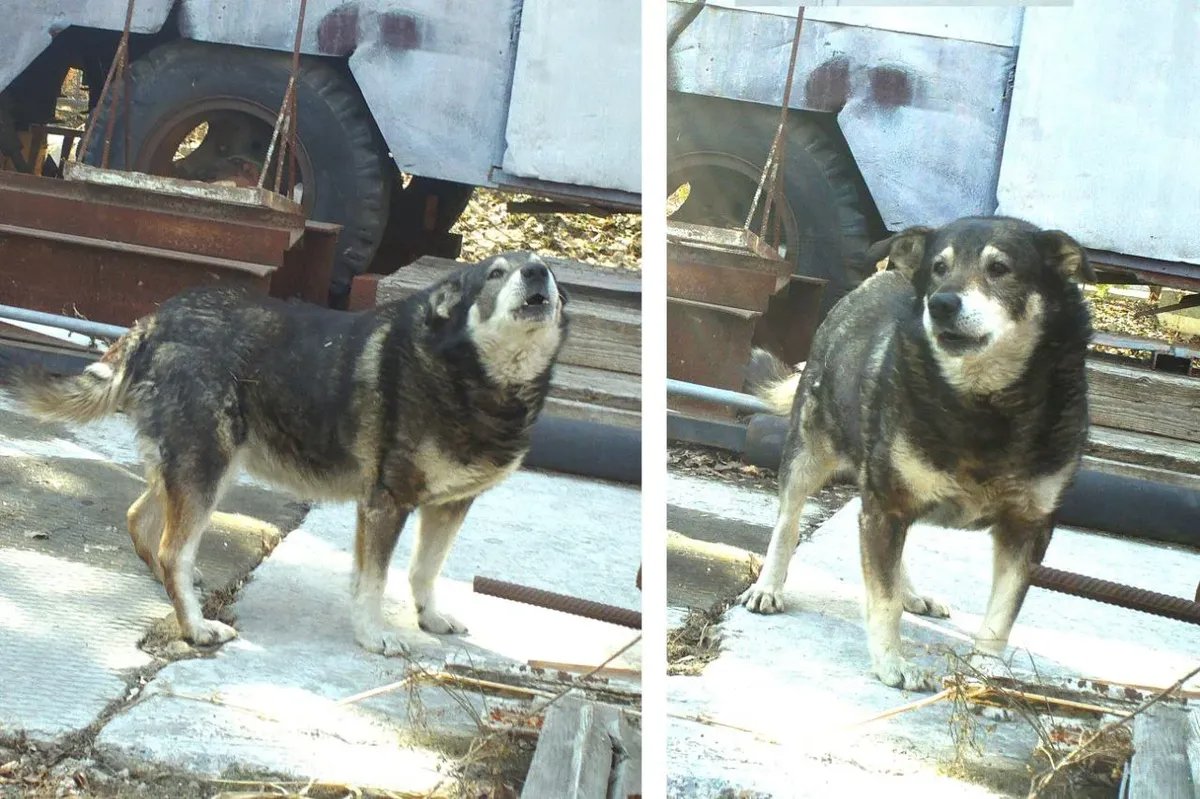
Journalist Igor Kuznetsov’s dog Volcha, who lives at the construction site after his arrest. Photo courtesy of Kuznetsov’s friends
“For some time after Igor’s arrest, she just wandered around,” says Kuznetsov’s lawyer Alexey Pryanishnikov. “In November 2021, the two women who fed her helped build a kennel near the house. The construction site guard feeds Volcha together with his own dog.”
Volcha was very stressed by Igor’s arrest and the loss of a home. She searched for him at first, then gave up.
This dog is untrusting, beaten down by life. It is quite difficult to approach her and take a picture, she thinks you’re preparing to attack and starts barking and backing away. But she never attacks. Volcha looks to be about 10 years old. Igor faces up to 10 years in prison. It’s not at all certain that they will ever meet again.
I do not know what is on the mind of the old dog Volcha as she is freezing at the construction site. I do not know if blind Blackie remembers what his owner looks like. I do not know if Bely remembers his shaman. I do not know if Eric understands that, with her letter, Anastasia was saying goodbye to him forever. I only know that in actual fact, things are even scarier than they seem.
Join us in rebuilding Novaya Gazeta Europe
The Russian government has banned independent media. We were forced to leave our country in order to keep doing our job, telling our readers about what is going on Russia, Ukraine and Europe.
We will continue fighting against warfare and dictatorship. We believe that freedom of speech is the most efficient antidote against tyranny. Support us financially to help us fight for peace and freedom.
By clicking the Support button, you agree to the processing of your personal data.
To cancel a regular donation, please write to [email protected]
